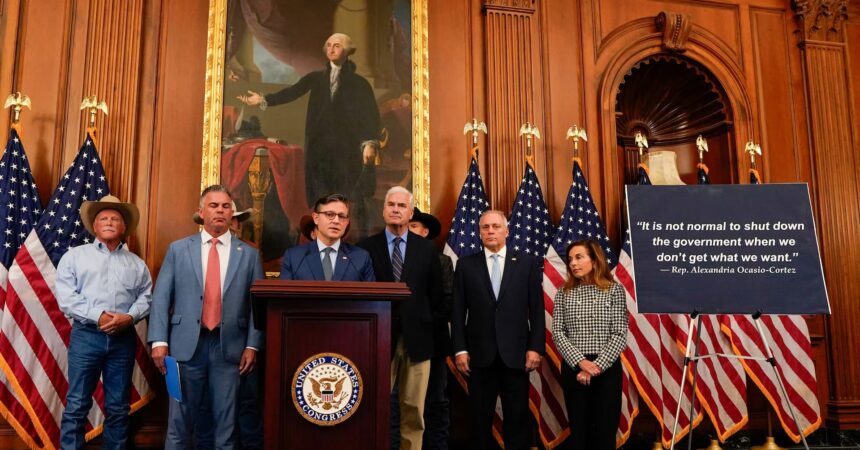The death of Charlie Kirk really shook things up in D.C. It wasn’t just about him as a person, but what his death represented. He was a loud, opinionated guy who wasn’t afraid to speak his mind. He built his name with rallies, speeches, podcasts, and strong opinions. He got crowds going and made people argue. Then, suddenly, he was gone because of violence.
Almost overnight, talks in Congress changed. Lawmakers weren’t just talking about money or winning elections anymore. They were talking about staying safe, about security, and whether leaders can even do their jobs without being in danger.
House Republicans quickly said Kirk’s death should be a wake-up call. Their idea? Add an $88 million security plan to a funding bill that has to pass to keep the government running. To them, it’s simple: there are more threats than before, and violence feels closer to home. Federal officials—members of Congress, judges, even Supreme Court justices—need better protection. One Republican lawmaker put it simply: “We can’t wait for another tragedy.”
The plan itself is pretty simple. It includes more security guards, better security systems, and better ways to keep an eye on threats. It even has extra protection for justices, who have been dealing with protests near their homes after some big decisions. Speaker Mike Johnson spoke up for the plan. “This is about protecting the people who serve this country,” he said. “The danger is real.” But if you know D.C., you know it’s never that simple. Democrats didn’t agree with the plan right away. It’s not that they don’t think there’s a danger, but they don’t like how Republicans are doing it. Some called the plan rushed.

Others said it seemed too connected to Kirk’s death, like it was all for show. Some asked why the plan only protects people in D.C.. What about local officials, election workers, or even schools places that are also seeing more threats these days?
Just like that, something that could have brought people together turned into another political argument. That’s just how politics is now. Even something as basic as security, something you’d think everyone could agree on, gets caught up in arguments about who gets what, how much, and why.
The timing makes things even worse. Congress is facing a deadline to get funding approved. If lawmakers don’t act, the government will shut down. By adding the $88 million request to that bill, Republicans made it part of a much bigger issue. Democrats are accusing them of using a tragedy to their advantage. Republicans say waiting is irresponsible. Regular people are probably just wondering if their leaders can run the country without constantly bringing it to the edge every few weeks.
But here’s the thing: the danger is real. The U.S. Capitol Police say threats are rising every year. There are angry letters, nasty calls, and real attempts to hurt or kill people. Everyone remembers January 6th. Some lawmakers are still dealing with the effects of that day. Then there was the attack on Paul Pelosi, the husband of the former Speaker. There were also threats to justices after big court decisions, and now there’s Kirk’s death.
For Republicans, this isn’t just a news story. It’s personal. Many of them have been through scary situations. Some have family members who’ve been threatened. With one of the most outspoken voices in the conservative movement gone, they feel like action is needed more than ever.
Democrats don’t deny the risks. They just want more accountability, like hearings and oversight. They want a plan that thinks beyond just D.C.. One Democrat put it this way: “Everybody wants to feel safe. But you can’t turn Congress into a fortress while the rest of the country is dealing with the same fears.”
The question of who gets protection, and who decides, is tough. For a family in Ohio, security means safer schools and neighborhoods. For lawmakers in D.C., it means fences, cameras, and guards. Both sides want safety, but they see it differently.
Charlie Kirk’s death has become a symbol in this debate. His supporters remember him as someone who was fearless and spoke his mind, even when it made trouble. His critics didn’t agree with his politics, but many were still shocked by the violence. After his death, his name has been brought up as a reason to act quickly and proof that America’s divisions can turn deadly.
So what can $88 million really do? Republicans say it can bring peace of mind. It can provide defenses, faster response times, and more people watching for threats. Critics say it will just create headlines and that true safety will come from reducing the anger in politics, not just from better security.
The truth is probably somewhere in between. More protection might stop some attacks, but it won’t get rid of the anger that’s spreading. America feels more divided, more hostile, and more willing to see political opponents as enemies. That anger isn’t just in D.C.. It’s in neighborhoods, churches, schools, and online. Security systems can only do so much when the culture itself is so tense.
For now, Congress is still fighting. Will the $88 million pass? Maybe. Republicans have some support. Democrats are resisting. The funding deadline makes things more dramatic. If it passes, Republicans will call it a victory for common sense. If it fails, Democrats will call it a stand against political theater. Either way, the fight shows a lot about where America is right now.
Charlie Kirk’s death was a tragedy. That’s clear. But instead of bringing leaders together, it’s become another thing that divides them. It’s another example of how, even when people are grieving, politics can still split the country even further.
One thing is certain, though: political violence is up, trust is down, and the sense of safety for leaders, families, and America itself feels weaker than it used to. Whether $88 million can change that is hard to say. But the fact that it’s even being discussed shows how much things have changed.
Republicans want action now. Democrats want to be careful and make bigger changes. And the public? They’re not asking for more guards at the Capitol. They’re asking for fewer reasons to be scared in the first place.
Until that happens, D.C. will keep arguing, and America will keep waiting.










